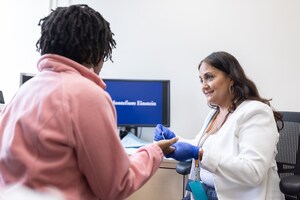Adult-Sized Adolescents Need Adult Dosing To Overcome Vitamin D Deficiency
Study Findings Have Implications for Addressing Serious Health Disparities for Adolescents of Color
NEW YORK, Dec. 18, 2015 /PRNewswire-USNewswire/ -- Adult-sized teens with vitamin D deficiency benefit from adult treatment dosages of vitamin D3, according to a new study from The Children's Hospital at Montefiore (CHAM) published today in The Journal of Pediatrics.
This eight-week randomized clinical trial of treatment of vitamin D deficiency with cholecalciferol (vitamin D3) in predominantly Hispanic and black adolescents, of which 33 percent were obese, showed that adult-sized adolescents benefited from doses of vitamin D3 based on adult treatment recommendations as compared to current recommendations for children and adolescents.
"Evidence informing guidelines for treatment of vitamin D deficiency in the adolescent age group is lacking and much confusion exists among clinicians as to optimal treatment regimens," said Hina J. Talib, M.D., attending physician, CHAM and assistant professor of pediatrics, Albert Einstein College of Medicine. "Based on our results we would encourage clinicians caring for older children with a vitamin D deficiency to treat with higher total doses of vitamin D3, especially if the youth is obese. This is especially relevant for treating our patient population here in the Bronx, NY as well as for many other communities throughout the U.S."
The trial compared two, high-dose treatment regimens and one, low-dose regimen and found that response to both high-dose regimens were effective in raising levels of 25(OH)D out of the deficient range (≥20ng/mL), whereas a low-dose regimen of 1,000IU daily was much less effective. After eight weeks of treatment, none of the adolescent participants had toxic levels of 25(OH) D and many, even in the high-dose arms, still had not achieved vitamin D sufficiency (≥30 ng/mL). A critical additional finding was that obese participants had little more than half the mean change in their vitamin D level after treatment as compared to normal-weight participants and therefore require even higher dosing or longer duration of treatment.
The Endocrine Society's current recommendation for children ages one to 18 years with vitamin D deficiency is six weeks of treatment with either ergocalciferol (vitamin D2) or D3 at doses of 50,000IU/week or 2,000IU/day. For adults (18+) with a vitamin D deficiency, the recommendation is eight weeks of 50,000IU/week or 6,000IU/day. In their guidelines, the Endocrine Society acknowledges that clinical trials are needed to better inform recommendations across age and weight groups.
Research is expanding on the health benefits of vitamin D3, which may have potential implications for addressing health disparities prevalent among Hispanic and black adolescents. This study included predominantly Hispanic and black adolescents, whose mean age was 16.6 years, cared for at CHAM, the University Hospital for the Albert Einstein College of Medicine. Sixty-six percent of the patients had vitamin D deficiency and were eligible for the treatment trial, 35 percent were obese, and 63 percent had at least one chronic health condition that emerging evidence indicates may be worsened in the context of vitamin D deficiency. The findings of this study provide much needed evidence to inform new medical guidelines for physicians treating this vulnerable, pediatric population.
Vitamin D deficiency can be caused by diet and lack of exposure to sunlight or levels of melanin in the skin. Obese and darker-skinned adolescents suffer disproportionately from Vitamin D deficiency. In adolescents, the deficiency can be associated with low bone density and stress fractures as well as hypertension, hyperglycemia, and metabolic syndrome, which can have lifelong implications. Studies of both clinical and national samples of U.S. adolescents find that vitamin D deficiency is rising in prevalence, particularly among obese and darker-skinned youth.
The research team received support from the Block Institute for Clinical and Translational Research at Einstein and Montefiore (ICTR) funded by the National Institute of Health's National Center for Advancing Translational Sciences.
About Montefiore Health System
Montefiore is a premier academic health system and the University Hospital for Albert Einstein College of Medicine. Combining nationally-recognized clinical excellence with a population health perspective that focuses on the comprehensive needs of the communities it serves, Montefiore delivers coordinated, compassionate, science-driven care where, when and how patients need it most. Montefiore consists of eight hospitals and an extended care facility with a total of 2,747 beds, a School of Nursing, and state-of-the-art primary and specialty care provided through a network of more than 150 locations across the region, including the largest school health program in the nation and a home health program. The Children's Hospital at Montefiore is consistently named in U.S. News' "America's Best Children's Hospitals." Montefiore's partnership with Einstein advances clinical and translational research to accelerate the pace at which new discoveries become the treatments and therapies that benefit patients. The health system derives its inspiration for excellence from its patients and community, and continues to be on the frontlines of developing innovative approaches to care. For more information please visit http://www.montefiore.org. Follow us on Twitter; like us on Facebook; view us on YouTube.
SOURCE Montefiore Health System
WANT YOUR COMPANY'S NEWS FEATURED ON PRNEWSWIRE.COM?
Newsrooms &
Influencers
Digital Media
Outlets
Journalists
Opted In






Share this article